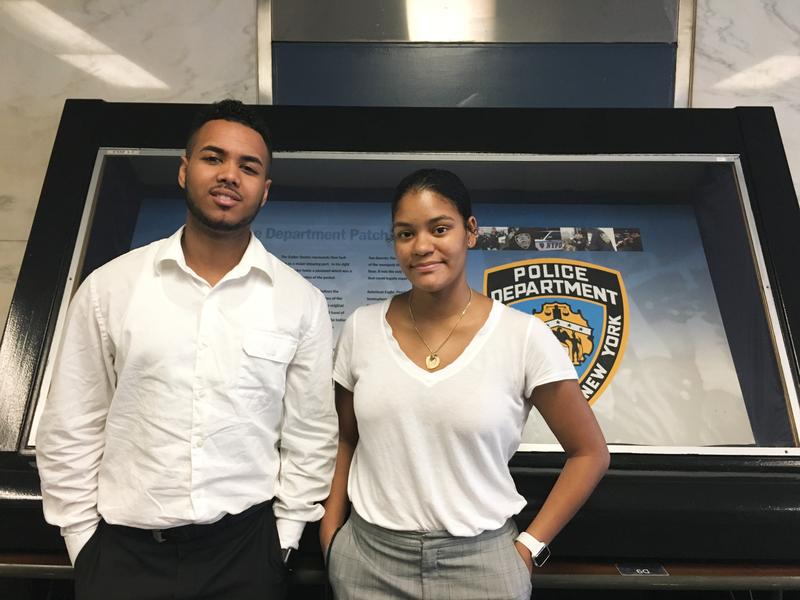
Early this year, the NYPD began a series of community meetings in select precincts with troubling violent crime rates. The meetings, which are still ongoing, have been an attempt to bring together residents and people who work in those neighborhoods to talk about safety in parts of the city where poverty rates outpace citywide averages, where poor public housing conditions are top-of-mind, and where residents may have negative views, or at least skepticism, of police.
The conversations were wide-ranging, said Alden Foster, a deputy director within the NYPD’s Community Affairs Bureau.
“We go into these meetings thinking the community was going to talk all about crime," Foster said. “It really wasn't about that.”
People spoke about things like homelessness, schools, drug use and the need for more city resources in their neighborhoods. One issue raised consistently, police leaders said, was a call for more opportunities for young people: places to go after school and on the weekends and, specifically, meaningful work.
So, over the summer, the NYPD provided some of those jobs. It filled the vast majority of positions in its annual internship program with young people from its nine focus precincts.
Foster and other members of the Community Affairs Bureau recruited students in either college or graduate school, or those who were recent grads. Foster said he visited community centers, showed up at basketball courts and met with college career directors to push the word out.
The department hired 114 young people from the focus precincts (out of 125 intern positions). Undergrads earned $15 per hour, while graduate level students earned $20.57 per hour. But it was the chance to gain professional experience, especially for those interested in having a career at the NYPD one day, that provided the most relief.
Twenty-year-old Marieli Concepción, who lives within the 44th precinct in the Bronx, was working a minimum wage job at McDonald’s and attending school full time at John Jay College of Criminal Justice when she landed the internship. Concepción aspires to be a police officer, and was more than happy to quit her fast-food job.
“I'm actually doing something that I want to do in my career,” she said, on a recent workday at her NYPD job. She was assigned to the division that assesses candidates applying to become police officers. She spoke in a first floor hallway of the administrative building in Manhattan next to a historical timeline of the police department. On the opposite wall hung quilts honoring officers who died on September 11th.
“I feel very welcome in this building,” said Concepción. “At McDonald's, I didn't feel welcome. Nobody wanted to be there.”
The formal internship program ended earlier this month, and Concepción is continuing to work part-time at the NYPD as a college aide. Working in the police department has meant that she sits in on meetings with high-ranking chiefs and gets to offer her opinion. Interns took field trips to learn more about various police units. Police officials held focus groups with the interns too, to get more perspective on their neighborhoods.
Yanvier Morel, from the 40th precinct in the South Bronx, who also aspires to be a police officer, researched hate crimes over the summer and gave a presentation to senior leaders.
“I felt like a boss, to be honest,” Morel said. “As soon as you walk into the room, there are so many chiefs and they all really want to hear your opinion. And I’m like, ‘My voice matters.’”
Morel, like Concepcion, is a student at John Jay. He said that if the logistics fall into place, he will join the police academy this fall and will still be able to graduate from college this year.
He previously worked seven days a week at Starbucks — a job he hated, he said, mostly because of the way customers treated employees. In contrast, working at the police department has given him career confidence.
“I just learned that, actually, I'm capable of doing things that maybe I never thought in a million years that I will be doing,” Morel said. “I never thought I would be, you know, working with detectives, lieutenants, captains, chiefs.”
Morel, 21, said that he’s received raised eyebrows back in his neighborhood when he’s worn his “NYPD intern” shirt. People harbor trust issues, he said. Even he would avoid police officers on the street in his teenage years, though he said he never had negative interactions with officers.
Concepcion said as much: she did not have negative encounters with police, nor did the crowd she hung out with. But she was still keenly aware of the mistrust of police in many parts of the Bronx, and the sentiment weighs on her career goals.
“Would people think that I'm bad if I'm a police officer?” she said. “I don't want someone to just look at me and my uniform and say that this person is a bad person because of the career that they chose.”
But she said she realizes these thoughts come from other people's perceptions, not her own.
